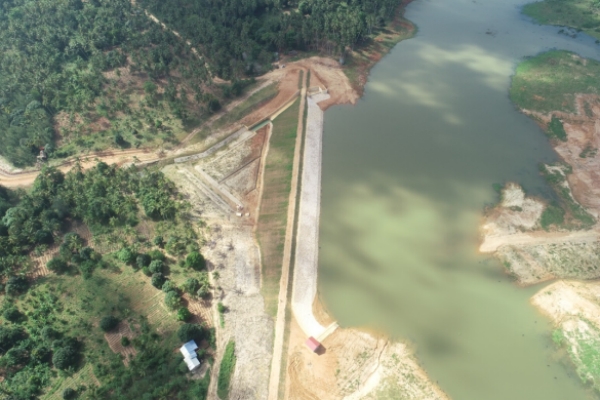In Zanzibar, Tanzania, outdated agricultural water infrastructure has long hampered local development. Out of over 8,000 hectares of land with irrigation potential, only 800 hectares are effectively irrigated, significantly limiting agricultural progress.
In June 2019, the Sinohydro Bureau 9 Co., Ltd, a subsidiary of the Power Construction Corporation of China (PowerChina), commenced work on the Zanzibar Agricultural Irrigation Infrastructure Project, a key initiative that has brought hope to the region. The project is the largest example of agricultural irrigation development underway in the area and is seen as vital for improving farmers’ income.
The project includes the construction of four reservoirs, 49 wells, 113.5 kilometers of irrigation canals, 94.7 kilometers of drainage ditches, 100 kilometers of farm roads and the leveling of 1,524 hectares of land. It spans seven irrigation zones, six of which have already been completed and handed over.

An aerial view of the Zanzibar Agricultural Irrigation Infrastructure Project in Tanzania [Photo/sasac.gov.cn]
Through the construction of water channels, roads and farmland leveling, the project has enabled farmers to fully utilize water resources, establishing a modern agricultural network that integrates water storage, drainage and irrigation.
The project has not only improved agricultural output but also created significant employment opportunities for the local population. At its peak, approximately 500 local workers were employed, including operators, cooks, and drivers, achieving a localization rate of 90 percent.
Earlier this year, People’s Daily reported on how the project has increased local grain production and improved farmers’ incomes, while it previously reported on the project’s positive impact on the region’s food production and rural development.
Sinohydro Bureau 9 Co., Ltd has demonstrated its commitment to enhancing “small yet smart” livelihood projects, embodying corporate responsibility in the joint pursuit of high-quality Belt and Road cooperation.
The project has added over 1,000 hectares of irrigable land, significantly boosting local food production and improving food security, helping reduce the region’s reliance on imported grain and improving local livelihoods.
(Executive editor: Zhu Zeya)